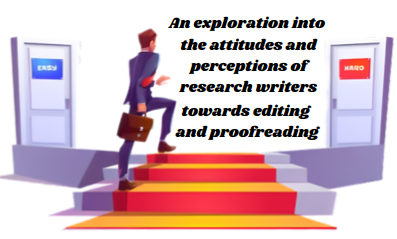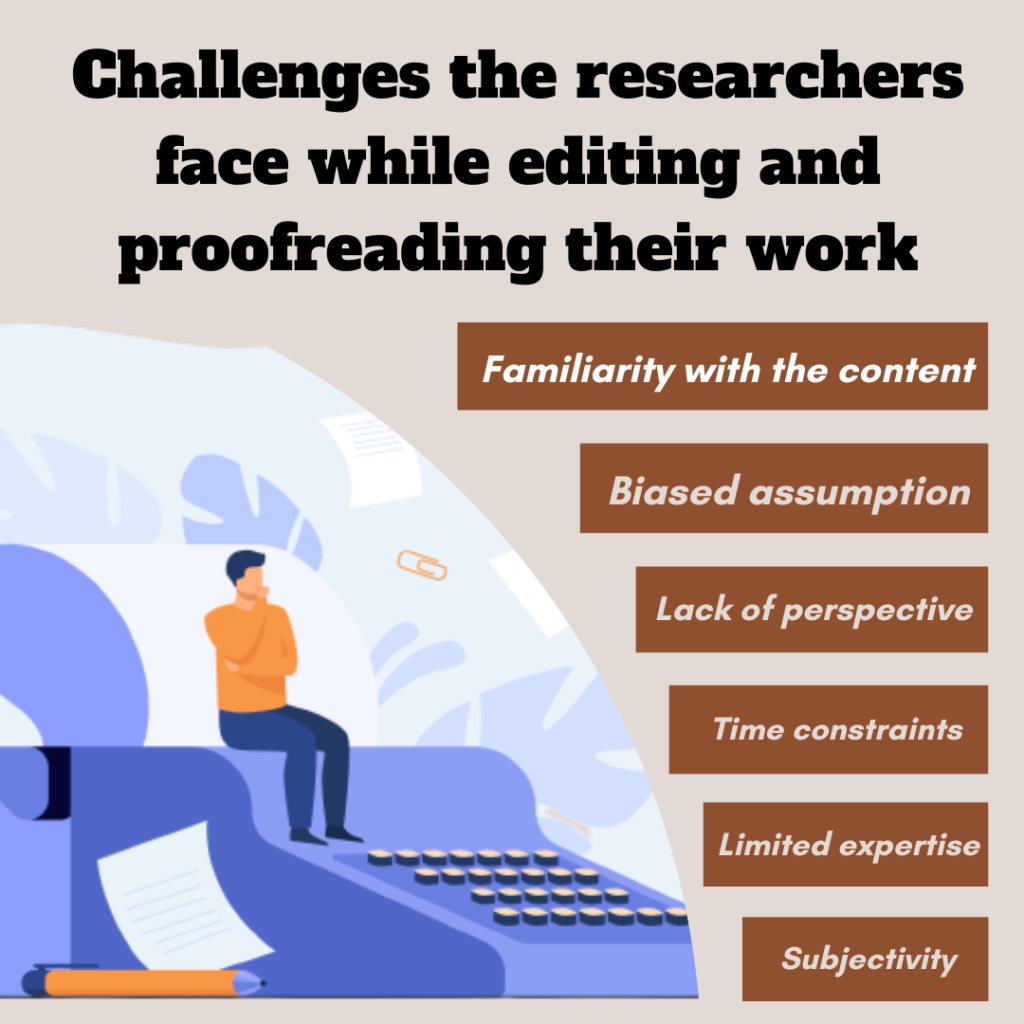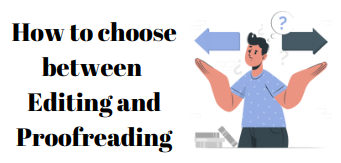The attitude and perception of the research writers are changing at a rapid pace towards editing and proofreading. The main factor behind this is that there are many common mistakes authors make while editing and also many do not have any idea about how to choose between Editing & Proofreading. So, in this blog, we will explore editing and proofreading in light of the frequent questions we receive to address this issue.
Before delving deep into the topic, we need to understand What is Journal Manuscript Editing and Why is it important? Because if we don’t understand Manuscript Editing, then we cannot compare Editing Vs Proofreading. So, let’s begin.
Manuscript editing is the process of reviewing and revising a written work, such as a book, article, or academic paper, to improve its clarity, coherence, and overall quality. The goal of editing is to make the manuscript more polished, readable, and effective in conveying the author’s intended message to the audience.
There are different types of editing, including copy editing, which focuses on correcting errors in grammar, punctuation, spelling, and formatting, and developmental editing, which involves more substantive changes to the content, structure, and style of the manuscript.
Now, what are the Common Mistakes authors Make while Editing? They skip the editing process altogether, focus too much on minor details, edit too quickly, not seeking feedback and are too attached to their own words.
Editing is important because it helps to ensure that the manuscript is of high quality and meets the expectations of the intended audience. A well-edited manuscript is more likely to be published or accepted for publication, and it can also improve the author’s reputation and credibility as a writer. In addition, editing can help authors to clarify their ideas, improve the organization and flow of their writing, and eliminate inconsistencies or errors that could undermine the effectiveness of their message.
Many research writers view editing and proofreading as tedious or time-consuming tasks that they would rather avoid. Some may also feel that they lack the necessary skills or knowledge to do a good job.
Research writers may feel like editing and proofreading is tedious or time-consuming for several reasons:
- Editing and proofreading require a lot of attention to detail: Editing and proofreading involve carefully reviewing a text for errors in grammar, spelling, punctuation, syntax, and formatting. This can be a very meticulous and time-consuming task that requires a high level of concentration and focus.
- Editing and proofreading can be repetitive: Depending on the length of the document, editing and proofreading can involve reading the same text multiple times to catch different types of errors. This can be monotonous and may feel like a chore, especially if the writer is already familiar with the content.
- Editing and proofreading may not feel as creative or intellectually stimulating as other aspects of writing: For some writers, the process of generating new ideas, conducting research, or crafting arguments may be more fulfilling than the process of revising and polishing their work. As a result, they may feel like editing and proofreading is less enjoyable or rewarding parts of the writing process.
- Editing and proofreading may not be viewed as important as other aspects of writing : Some writers may prioritize content creation over editing and proofreading, feeling that their ideas and arguments are more important than grammar and spelling. However, this can lead to errors that detract from the overall quality and impact of the writing.
There are several ways to improve your editing and proofreading skills:
- Read widely: One of the best ways to improve your editing and proofreading skills is to read widely in the genre or subject area in which you are writing. This will help you develop an ear for language, style, and tone, and familiarize yourself with common grammatical and stylistic conventions.
- Take a course or workshop: Consider taking a writing course or workshop that includes instruction on editing and proofreading. These classes can teach you specific techniques and strategies for improving your writing and spotting errors.
- Practice regularly: Like any skill, editing and proofreading require regular practice to improve. Set aside time each day or week to practice editing and proofreading, whether it’s reviewing your work or editing and proofreading the work of others.
- Use tools and resources: There are a variety of online tools and resources available that can help you improve your editing and proofreading skills. These include grammar checkers, style guides, and writing communities that provide feedback and support.
- Seek feedback: Ask a colleague or mentor to review your work and provide feedback on your editing and proofreading skills. Be open to constructive criticism and use it as an opportunity to learn and grow.
- Develop a checklist: Create a checklist of common errors and issues to look for when editing and proofreading. This can help you stay focused and ensure that you are thorough in your review.
Research writers may have different attitudes and perceptions towards different types of editing and proofreading. For example, some may view grammar and spelling checks as more straightforward and necessary, while others may prioritize more substantive editing tasks such as improving organization or argumentation. Now, what is the reason the research writers have different attitudes and perceptions towards different types of editing and proofreading?
- Personal preference: Different writers have different preferences when it comes to editing and proofreading. Some writers may prefer more hands-on editing, while others may prefer a lighter touch. This can be due to personal writing style or past experiences with editors.
- Writing experience: Experienced writers may have a better understanding of the editing and proofreading process and may be more open to feedback and suggestions from editors. Novice writers may be more resistant to changes or suggestions as they are still developing their writing skills.
- Type of document: Different types of documents may require different levels of editing and proofreading. For example, a scientific research paper may require more technical editing, while a personal essay may require more stylistic editing.
- Time constraints: Some writers may be under tight deadlines and may not have the luxury of multiple rounds of editing and proofreading. This can impact their attitude towards the editing process and may require a faster, more streamlined approach.
- Editor’s approach: The editor’s approach to editing and proofreading can also influence the writer’s attitude. Some editors may be more collaborative, while others may be more directive with their assignments. The level of trust and rapport between the writer and editor can also impact the writer’s perception of the editing process.
Research writers may have varying degrees of familiarity with different editing and proofreading tools and resources. Some may be comfortable using online grammar checkers or professional editors, while others may prefer to rely on their skills and expertise. But why is that? Let’s know it.
- Education and training: Some research writers may have received formal education or training in editing and proofreading, which would make them more familiar with the tools and resources available. This could include courses in English grammar and composition, or workshops specifically focused on editing and proofreading.
- Writing experience: Experienced writers may have had more exposure to different editing and proofreading tools and resources, either through their own research or through working with editors. They may have a better understanding of what works best for them and their writing process.
- Access to resources: Research writers may not have access to the same editing and proofreading tools and resources depending on their location, budget, or institutional support. For example, some writers may not have access to expensive editing software or may not be able to afford a professional editor.
- Personal preference: Research writers may have personal preferences for certain editing and proofreading tools and resources over others. For example, some writers may prefer to use a specific style guide or software that they feel is more effective for their writing.
- Time constraints: Research writers may not have the time to explore different editing and proofreading tools and resources. They may need to rely on tools and resources they are already familiar with to meet deadlines.
There are various challenges the researchers face while editing and proofreading their work which can help us to understand the reason for the attitude and perception of the research writers.
- Familiarity with the content: Researchers are intimately familiar with their work, which can make it difficult to identify errors or areas that need improvement. They may overlook mistakes or gaps in their reasoning because they already know what they intended to convey.
- Bias: Researchers may be biased towards their work and may have a difficult time being objective about their writing. This can lead to a lack of critical evaluation, making it harder to spot errors or areas that need improvement.
- Time constraints: Researchers often have tight deadlines and may not have the luxury of spending a lot of time editing and proofreading their work. This can lead to rushed and incomplete editing, which can result in errors being overlooked.
- Lack of perspective: Researchers may be so focused on their work that they lose sight of the bigger picture. They may have a difficult time seeing their work from the perspective of their readers, which can make it difficult to identify areas that may be confusing or unclear.
- Subjectivity: Editing and proofreading are inherently subjective processes, and researchers may have different opinions on what constitutes good writing than their readers or peers. This can make it difficult to make decisions about what changes to make or what areas need improvement.
- Limited expertise: Researchers may have limited expertise in editing and proofreading, especially if they have not received formal training or education in these areas. This can make it difficult to identify errors or know how to improve the overall quality of their writing.
Apart from the challenges, there are various potential biases or ethical considerations in editing and proofreading the research writing. And also, the researchers get affected by the potential biases or ethical considerations while editing and proofreading their work because of these biases.
- Authorship: Editors and proofreaders need to ensure that they do not take credit for the work they are editing or proofreading. It is important to acknowledge the authorship of the work and give credit where it is due. Researchers may feel that their work is being altered or misrepresented if an editor or proofreader takes credit for the work they have edited. Researchers need to ensure that their authorship is acknowledged and that any changes made are done with their permission and approval.
- Confidentiality: They may come across confidential or sensitive information when working on research writing. They need to maintain the confidentiality of the information and not share it with others without the author’s permission. Researchers may be concerned about the confidentiality of their work if an editor or proofreader comes across sensitive or confidential information. They may want to ensure that their work is only seen by authorized individuals and that their privacy is respected.
- Objectivity: The Editors and proofreaders must be objective and unbiased when editing and proofreading research writing. They should not let their personal biases or opinions influence their work or make changes that would alter the meaning of the author’s work. Researchers may be concerned about the objectivity and bias of the editor or proofreader. They may worry that the editor or proofreader may make changes that alter the meaning or intent of their work, or that they may not be sensitive to the nuances of the research topic.
- Cultural sensitivity: Editors and proofreaders need to be aware of cultural differences and avoid making changes that would be insensitive or offensive to readers from different cultural backgrounds. Researchers may be concerned about the cultural sensitivity of their work, especially if their research involves different cultural groups. They may want to ensure that the editor or proofreader is sensitive to these differences and does not make changes that could be perceived as offensive.
- Plagiarism: They also need to ensure that the work they are editing or proofreading does not contain any instances of plagiarism. They should be familiar with the relevant plagiarism guidelines and ensure that the work meets the necessary standards. Researchers may be concerned about unintentional plagiarism or the risk of having their work plagiarized. They may want to ensure that the editor or proofreader is familiar with plagiarism guidelines and that they do not inadvertently introduce plagiarized content.
- Conflict of interest: Editors and proofreaders should disclose any potential conflicts of interest, such as a personal or financial relationship with the author, that could compromise their objectivity or the quality of their work. Researchers may be concerned about conflicts of interest if the editor or proofreader has a personal or financial relationship with them. They may want to ensure that the editor or proofreader discloses any potential conflicts of interest and that they are comfortable with the editing or proofreading being done.
- Informed consent: They should obtain informed consent from the author before making any changes to their work. They should explain the editing and proofreading process to the author and ensure that they are comfortable with the changes being made. Researchers may be concerned about the changes being made to their work and may want to ensure that they are consulted and that their consent is obtained before any changes are made. They may want to review and approve any changes before the work is finalized.
Finally, we have come to the question of how to choose between Editing & Proofreading. So, let us choose between Editing and Proofreading.
Choosing between editing and proofreading depends on what the author is looking to accomplish and the stage of the writing process they are in. Here are some guidelines to help make the decision:
- Editing: Editing is a more comprehensive process that involves reviewing the manuscript for issues related to structure, content, style, and grammar. Editing is typically done during the revision stage when the author has completed a rough draft of the manuscript and is looking to improve its overall quality. Editing can involve substantial revisions to the content, including rewriting sections, reorganizing the structure of the manuscript, and clarifying the language used.
- Proofreading: Proofreading is a more focused process that involves reviewing the manuscript for errors related to spelling, punctuation, and grammar. Proofreading is typically done after the manuscript has been edited and is in its final stages, just prior to publication. Proofreading is a final check to ensure that the manuscript is free of any errors that may have been missed during the editing process.
So, if an author is looking to improve the quality of their writing and make substantive revisions, editing is the way to go. On the other hand, if the author is looking to ensure that their writing is error-free and ready for publication, proofreading is the right choice.
In some cases, a manuscript may require both editing and proofreading, and it’s important to allocate sufficient time and resources to each stage to ensure that the final product is of high quality.If you have any questions, you can comment below and also you can visit our websites https://www.editingproofreading.in/manuscript-editing-services.php and https://www.editingproofreading.in/compare-services.php to learn more about us.


